

ASLA 2011. Anne Whisken: Action Research. Toolkit - ACRL Framework for Information Literacy Toolkit - LibGuides at ACRL. You can use the Toolkit resources in a variety of ways: for your individual professional development needs; to form a community of practice with your colleagues around the Framework and information literacy; and to develop workshops and professional development opportunities in your libraries and also for local, regional, and state-level events and conferences.
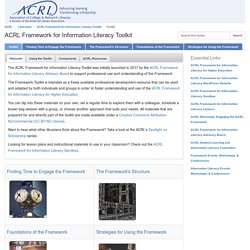
All materials that are prepared for and directly part of the toolkit are made available under a Creative Commons Attribution-Noncommercial (CC-BY-NC) license. Modules are designed to be adapted and tailored to the needs of the audience. You are free to pick and choose among the modules and the content; don’t feel that you have to start at the beginning and work through all the activities. The Toolkit is designed for librarians. A platform and repository for sharing Framework materials. What’s the Matter with Threshold Concepts? ACRLog welcomes a guest post from Lori Townsend, Learning Services Coordinator at the University of New Mexico; Silvia Lu, Reference and Social Media Librarian and Assistant Professor, LaGuardia Community College, CUNY; Amy R.
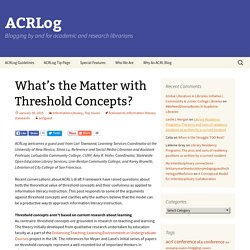
Hofer, Coordinator, Statewide Open Education Library Services, Linn-Benton Community College; and Korey Brunetti, Librarian at City College of San Francisco. Recent conversations about ACRL’s draft Framework have raised questions about both the theoretical value of threshold concepts and their usefulness as applied to information literacy instruction. This post responds to some of the arguments against threshold concepts and clarifies why the authors believe that the model can be a productive way to approach information literacy instruction. Association of College & Research Libraries. ACRL is the source that the higher education community looks to for Standards, Guidelines, and Frameworks on academic libraries. ACRL develops Standards, Guidelines, and Frameworks to help libraries, academic institutions, and accrediting agencies understand the components of an excellent library.
These Standards, Guidelines, Frameworks, and model statements are reviewed and updated by the membership on a regular basis. Framework for Information Literacy for Higher Education. Filed by the ACRL Board on February 2, 2015.
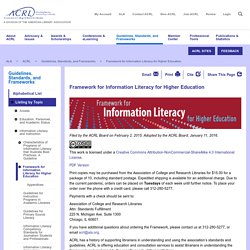
Adopted by the ACRL Board, January 11, 2016. This work is licensed under a Creative Commons Attribution-NonCommercial-ShareAlike 4.0 International License. PDF Version. Information Literacy for Faculty and Administrators. Standards Toolkit. Information Literacy in the Disciplines Guide. Instruction Section Website The Instruction Section is part of ACRL, a division of ALA.
Skip to content. Psychology Information Literacy Standards. Approved at ALA Annual Conference, June 2010.
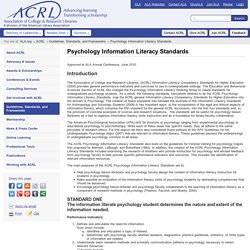
Introduction.
Anglophone guides. Plagiarism. Types of research papers. Thesis Statement. Citation. Information Literacy Tutorials: FirstBridge Project. The Fall 08 Information Literacy in FirstBridge experimental project: an overview.
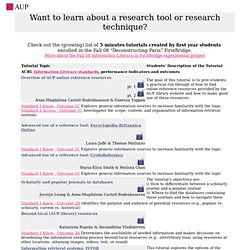
Four Mistakes I Made When Assigning Podcasts. [This is a guest post by Evan Cordulack (@cordulack), a Web developer and graduate student in American Studies at the College of William & Mary. He writes regularly on the Academic Technology blog. --JBJ] Several years ago I taught two upper-level American Studies seminars. Since these were the first classes I’d ever taught (aside from being a Teaching Assistant), perhaps I should have kept things simpler. Rather than assign a combination of papers and exams, I’d wanted to try something different. At first, I saw all the benefits podcasting had to offer. The reality of my podcasting experiments was a series of realizations about how I hadn’t thought these assignments all the way through.
Mistake 1: I Didn’t Limit the Student’s Production Time Going into these classes, I figured that students should have flexibility in how involved they wanted their podcasts to be. This strategy didn’t work and if I were to do it again, I would have provided more guidance for the students. Return to Top. International Literacy Association. E-pub brings together worldwide Information Literacy resources available in 42 languages.
During the last decades, a need for educational resources on Information Literacy was identified by the professional community, encouraging both UNESCO and the author to produce such a publication.
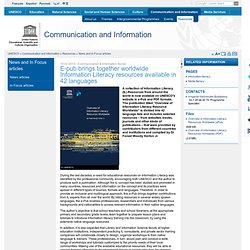
Although the IL concept has been studied and promoted in many countries, resources and information on the concept and its practices were spread in different types of sources, formats and languages. Therefore, in order to provide an inclusive and multilingual approach, this e-Pub brings together contributions from IL experts from all over the world. By listing resources in several widely spoken languages, the e-Pub enables professionals, researchers and individuals from various backgrounds and nationalities to access relevant information in their native languages.
European Conference on Information Literacy. The European Conference on Information Literacy (or ECIL) is organized by the Department of Information Management of Hacettepe University and Department of Information and Communication Sciences of Zagreb University.
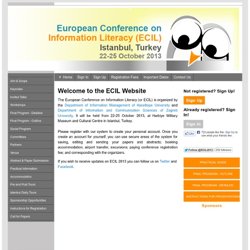
It will be held from 22-25 October 2013, at Harbiye Military Museum and Cultural Centre in Istanbul, Turkey. Please register with our system to create your personal account. Once you create an account for yourself, you can use secure areas of the system for saving, editing and sending your papers and abstracts; booking accommodation, airport transfer, excursions; paying conference registration fee; and corresponding with the organizers.
National Forum on Information Literacy. 21st Century Information Fluency. Information fluency home. Project Information Literacy: A large-scale study about early adults and their research habits. Information Literacy Minimum Standards: Undergraduates. The Literature Review: A Few Tips On Conducting It. Printable PDF Version Fair-Use Policy What is a review of the literature?
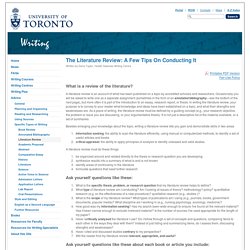
A literature review is an account of what has been published on a topic by accredited scholars and researchers. Occasionally you will be asked to write one as a separate assignment (sometimes in the form of an annotated bibliography—see the bottom of the next page), but more often it is part of the introduction to an essay, research report, or thesis. In writing the literature review, your purpose is to convey to your reader what knowledge and ideas have been established on a topic, and what their strengths and weaknesses are.
As a piece of writing, the literature review must be defined by a guiding concept (e.g., your research objective, the problem or issue you are discussing, or your argumentative thesis). Besides enlarging your knowledge about the topic, writing a literature review lets you gain and demonstrate skills in two areas. Literature Reviews. What this handout is about.
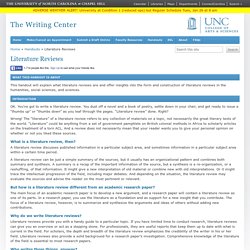
Project-Based Learning Journey.